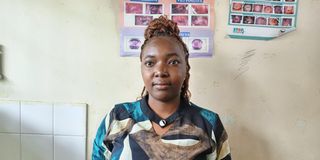My experience undergoing a Pap smear test at PGH

Purity Kinuthia at Nakuru teaching and Referral hospital, room 9, where she got a Pap Smear test.
The first time I heard of the need for Pap Smear screening was in 2023, through Elizabeth Mbugua,29, who shared her journey on surviving cervical cancer.
Fast forward to February 2024, I came across a poster on Free Pap Smear screening at the Nakuru Referral and Teaching hospital from March 1 to March 31.
With encouragement from a friend, I went to block 9, at PGH where the Pap Smear screening is being done.
At the facility, I was received by reproductive health nurses Jacky Kiio and Sahar Mosop alongside reproductive health clinician Lonah Koskei.
Warmly, Ms Mossop explained to me that I would be receiving two tests for the cervical cancer screening as well as a physical breast cancer check.

Equipment used for pap smear screening.
I was a bit nervous but she assured me the tests were painless and only took a few minutes.
She starts by filling in my medical history, to check on my eligibility for the test.
This included whether I had undergone the pap test before, my age, when I last experienced my menstrual flow and, in a few minutes, we were done.
For the Pap test, a speculum, brush and slide were used to collect samples which would be used for cervical cancer screening.
Behind a curtain that offered privacy, I was asked to undress waist down and cover myself up. I first got a breast cancer check where Ms. Mossop checked for any lump or any other changes on my breast.
Soon after, the pap smear was done. She placed a speculum in my private area to collect the samples. The process was uncomfortable but painless.
Two cervical cancer tests were conducted concurrently; a Pap Test which I was to get the results in less than two weeks’ time and a visual inspection on acetic acid (vinegar). I got the results for this immediately.
Explaining to me the importance of the procedure, Head of Department at the Reproductive health unit at the Nakuru Referral and Teaching Hospital, Dr. Emmanuel Sinei, noted that the procedure allows for samples to be collected on the walls of the cervix for analysis.

Dr Emmanuel Sinei, an obstetrician and gynaecologist heading the Reproductive health unit at the Nakuru Teaching and Referral hospital.
“Cervical cancer is caused by a Human Papilloma virus infection (HPV), a sexually transmitted disease (STD). Therefore, early screening allows for doctors to check whether a patient has the HPV infection which can either be low-risk or high-risk strain which can cause cancer,” he says.
He notes that the Pap test can be done for women from the age of 21 years although the recommended age would be up to 26 years.
“Since HPV can be transmitted to girls who have already had the sexual debut, we recommend cervical cancer vaccination for girls from age 9 to 15. However, women up to 26 years can get a catch-up cervical cancer vaccine although its effectiveness cannot be matched as that of receiving it at a tender age. This is why, screening is now recommended for women up to 26 years of age,” he explains.
He further explains that, depending on the results obtained after the test, further medical attention can be sought for patients whose results turn out to be positive. One can get a biopsy test for further check-up.
On the other hand, if negative, the patient is advised to have the next Pap Smear after three years.
“Testing would normally go for around sh 700. However, for the month of March the testing is free at PGH. Cervical cancer is preventable with early screening,” he concludes.
